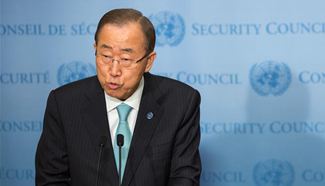
(Xinhua photo)
by Lan Xi, Lu Chengyi
BERLIN, July 11 (Xinhua) -- Arbitration on the South China Sea initiated unilaterally by the Philippines is a possible abuse of international law, Cai Congyan, international law professor at Xiamen University and visiting scholar at Humboldt University told Xinhua here in a recent interview.
Cai said: "The Philippines' unilateral request for arbitration on the South China Sea could be deemed as abuse of international law, at least not in good faith."
He said China and ASEAN countries including the Philippines have signed the Declaration on the Conduct of Parties in the South China Sea (DOC) in 2002 that includes a dispute settlement mechanism. However, the Philippines did not fully utilize the mechanism in accordance with the Declaration.
What China opposes is the unilateral initiation of arbitration by a concerned party in the South China Sea when the dispute settlement mechanism under the Declaration is not fully made use of, Cai said.
"In this case, the arbitral tribunal did not interpret the rules of international law as well as the real intention behind the Philippines' arbitration claims appropriately. It also presents a higher risk in abuse of international law by international dispute settlement bodies and their problematic expansion of jurisdiction prevails," he added.
An increasing number of countries are also raising doubts on the neutrality and independence of arbitrators in this case. "The appointment of arbitrators in this case is obviously unjust. Therefore, the legitimacy of such a formation can hardly be guaranteed," said Cai.
According to him, China excluded maritime delimitation from compulsory arbitration in a declaration made in 2006, in accordance with UNCLOS concerning the optional exceptions to the applicability of the U.N. Convention, which means the arbitral tribunal has no jurisdiction on such issues.
In the arbitration on the South China Sea, the tribunal held that the Philippines' "pretending" claims only refer to the interpretation of UNCLOS, only because the exempted issue of maritime demarcation was not literally included in the Philippines' claims.
"However, the interpretation of UNCLOS in this case involves disputes among China and other neighboring countries, including the Philippines, on maritime delimitation and islands sovereignty and maritime demarcation in the South China Sea," Cai said, adding that the arbitral tribunal in this case has misinterpreted the meaning of optional exceptions made by China.
Cai said negotiations were a legal obligation under the DOC. The Declaration was signed by multilateral parties including China and other neighboring countries of the South China Sea and was repeatedly reiterated by leaders of the signatory countries in their intergovernmental engagements over a long period of time.
"In my view, the arbitral tribunal did not conduct adequate review or a reasonable judgment on the legal role of negotiation in this case," he said.
In Cai's opinion, consultation and negotiation can better facilitate the settlement of disputes, especially sensitive ones between countries.
"The arbitral tribunal on the South China Sea will not help solve the dispute," Cai said, "Such practice of the tribunal could worsen the dispute. The international community should focus more on dispute settlement and restoring order."
According to the Statute of International Court of Justice (ICJ), an important mission of ICJ is to settle disputes and restore order, Cai said. The tribunal of this case merely has a single-sided understanding of what an international dispute settlement body should do and its understanding on its own mission and nature is not in line with the statute of ICJ, he added.
He said legal loopholes sometimes exist in international law, part of which are "constructive ambiguities," which should have given some leeway with intent for various parties to reach agreements. However, the South China Sea arbitration represents an abuse of an incomplete system of international law, Cai said.











